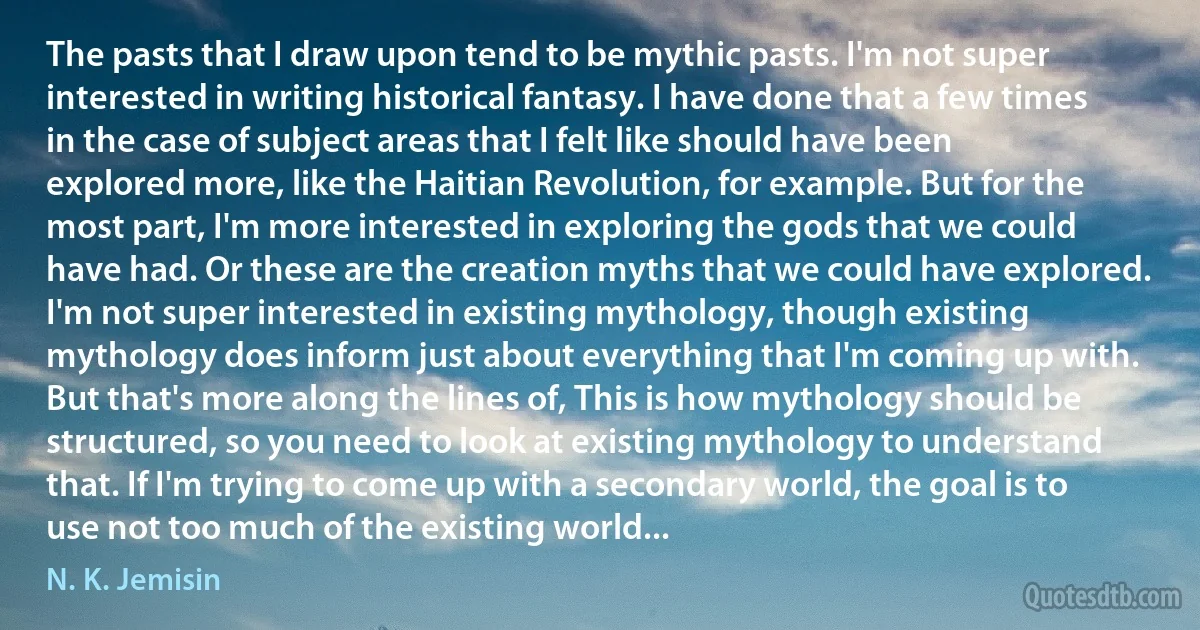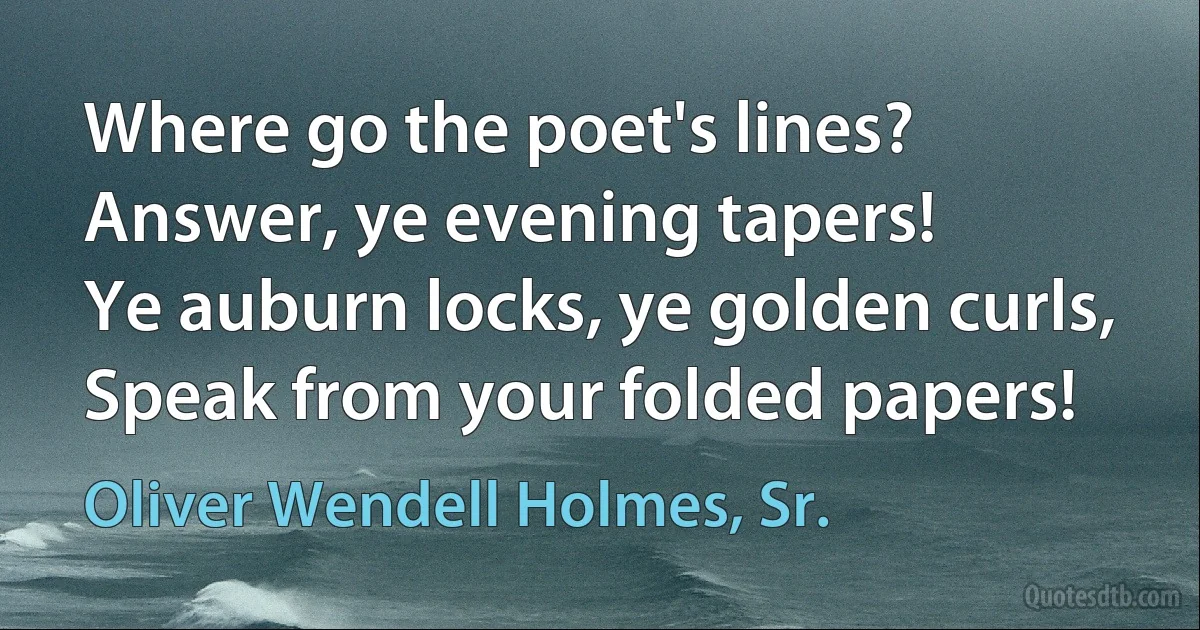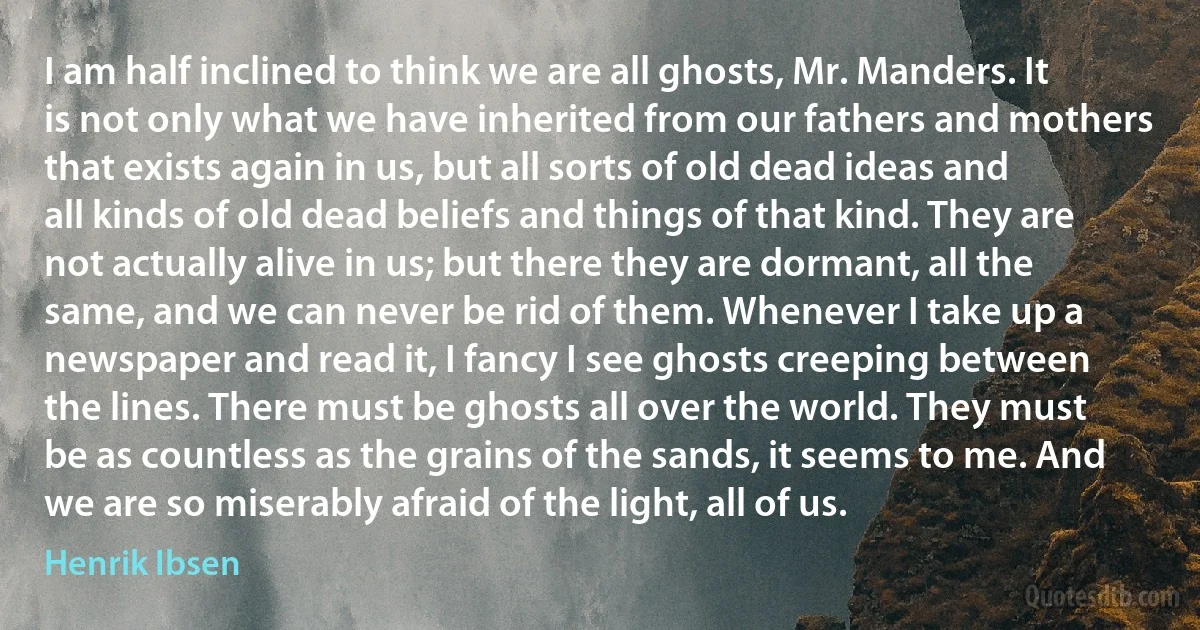Lines Quotes - page 59
Cornstalk was often seen with his warriors. Brave without being rash, he avoided exposure without shrinking; cautious without timidity in the hottest of the battle, he escaped without a wound. As one of the warriors near him showed some signs of timidity, the enraged chief, - with one blow of his tomahawk, cleft his skull. In one of the assaults, Colonel Fields, performing his duty bravely, was shot dead. ... The faltering of the ranks encouraged the savages. "Be strong! Be strong!" echoed through the woods over the savage lines in the tones of Cornstalk; and as Captain after Captain, and files of men after files of men, fell, the yells of the Indians were more terrific and their assaults more furious.

Cornstalk
The work to be done is so acutely needed and the perils of its non-accomplishment are so appalling that it is necessary to indicate certain major lines of danger and certain national aptitudes which carry a menace to the peace of the world. These problems fall naturally into two categories:
I. The internal, psychological problems of the individual nations.
II. Major world problems, such as the relation between nations and business and the forces of labour.

Alice Bailey
The plans, which embody these two differing ideals and objectives, are carried down on to the astral plane, and thus into the world of desire. The lines of demarcation remain ever entirely clear as far as the workers in these two groups are concerned, but are not so clear where ordinary human beings and the world disciples and initiates are concerned. There is much chaos on the plane of desire, and the world Arjuna is today sitting in bewilderment between the two opposing forces or camps, recognising his relationship both to form and to [108] soul and at the same time wondering where his duty lies. His point in evolution determines his problem. Thus the two groups are working in opposition upon the plane of desire.

Alice Bailey
Two major problems will grow out of this discovery-one immediate in nature and the other to be later developed. The first is that those whose large financial interests are bound up in products which the new type of energy will inevitably supersede will fight to the last ditch to prevent these new sources of wealth from benefiting others.
Secondly, there will be the steadily growing problem of the release of man power from the gruelling labour and the long hours today required in order to provide a living wage and the necessities of life. One is the problem of capital and the other is the problem of labour; one is the problem of established control of the purely selfish interests which have for so long controlled the life of humanity and the other is the problem of leisure and its constructive use. One problem concerns civilization and its correct functioning in the new age and the other concerns culture and the employment of time along creative lines.

Alice Bailey
I am always interested in the ways of scoring the sound of the poem, especially a poem with long lines. Spaces within a line, double colons, slashes, are indications of pause, of breath, of urgency, they are not metrically exact as in a musical notation but they serve (I hope) to make the reader think about the sound of the poem-just as traffic symbols, when driving, make us almost unconsciously aware of a steep hill, an intersection, an icy bridge etc. Poets have used such indicators long before modernism-Dickinson's dashes and capitals are one example. Contemporary composers have also expanded on classical notation with new, self-invented markings. You want to find a way that is not random or chaotic but allows for various renderings of a line, a punctuation of the imagination.

Adrienne Rich
The fight for ideals can no longer take the form of fight between nations, because the lines of division on moral questions are within the nations themselves and intersect the political frontiers. There is no modern State which is completely Catholic or Protestant, or liberal or autocratic, or aristocratic or democratic, or socialist or individualist; the moral and spiritual struggles of the modern world go on between citizens of the same State in unconscious intellectual cooperation with corresponding groups in other states, not between the public powers of rival States.

Norman Angell
Governments around the world say they're engaged in a war against the coronavirus. [...] This kill-or-die idiom is more than casual rhetorical overkill. Many governments are symbolically but very deliberately calling, in this time of fear and uncertainty, for general conscription along military lines. This is so they can, while pointing to an insidious foreign enemy, aim their firepower against some of the most valuable institutions of domestic public life. They have been very successful so far.

Pankaj Mishra
Have you looked at a modern airplane? Have you followed from year to year the evolution of its lines? Have you ever thought, not only about the airplane but about whatever man builds, that all of man's industrial efforts, all his computations and calculations, all the nights spent over working draughts and blueprints, invariably culminate in the production of a thing whose sole and guiding principle is the ultimate principle of simplicity?
It is as if there were a natural law which ordained that to achieve this end, to refine the curve of a piece of furniture, or a ship's keel, or the fuselage of an airplane, until gradually it partakes of the elementary purity of the curve of a human breast or shoulder, there must be the experimentation of several generations of craftsmen. In anything at all, perfection is finally attained not when there is no longer anything to add, but when there is no longer anything to take away, when a body has been stripped down to its nakedness.

Antoine de Saint Exupéry
Perhaps the lines of nationalism and factionalism and every other goddamn "ism” in the world had reduced the chances for this weary planet. Or not. Nuclear devices had existed for over a century, and only four of them had ever been used in anger. This could be interpreted as proof of divine intervention, good luck, a sign that the human race was growing up, or ominous portent, depending upon one's standing in the "half-empty, half-full” school of cocktail-party philosophy.

Larry Niven
I was lucky because the same week that I went to prison the Americans crossed the Rhine and cut off the northern part of Holland, so there was no longer any possibility of being shipped out to a concentration camp. The rail lines were cut. So I was in prison in Amsterdam during the very last days of the war. We were sent to the men's prison and the girls were sent to a women's prison in a different place.

Abraham Pais
With inherited liberal principles, I feel that the free movement of all people is a good thing and one to be encouraged. ... The Declaration of Human Rights has for one of its Articles the right of the human being to take a nationality, to change it, and not to be denied the right arbitrarily to change it. I realise it is not as easy as that, but most of the difficulties are definable difficulties based on facts and situations which the economic planners now available to Government Departments should be able to grasp and measure. I believe that the basic problem which prevents more immigration is an economic one. ... [T]here is a nearer approach to the ideal of universal admission in the United States than there is here. I think we could learn something from that. ... If we were to work out some form of migration policy based on these lines we would be doing some service to that free movement of populations which is a vital prerequisite to understanding in all parts of the world.

Tony Benn
Europe was some time ago divided into two, I will not say hostile, but certainly not friendly, camps-the Triple Alliance and the Dual Alliance. There has been a tendency to obliteration of the hard-and-fast lines between those two camps... There has been a tendency to more direct inter-communication, more direct settlement; and this has been more favourable to a frank adjustment of the relations between these Powers; and we in our turn have now taken part in making a sort of arrangement with a view to creating greater frankness and friendliness between ourselves and France. It would not have been possible to establish this Agreement between ourselves and France some years ago, because the atmosphere... between ourselves and France may be said to have been of the glacial epoch. It has happily now changed to a genial epoch.

Edward Grey, 1st Viscount Grey of Fallodon
Now there must be some application of this spirit in times of peace or we cannot suddenly develop it in time of war. The strike situation in the United States at this time is a scandal to the country as a whole and discreditable alike to employer and employee. Any employer who fails to recognize that human rights come first and that the friendly relationship between himself and those working for him should be one of partnership and comradeship in mutual help no less than self-help is recreant to his duty as an American citizen, and it is to his interest, having in view the enormous destruction of life in the present war, to conserve, and to train to higher efficiency, alike for his benefit and for its, the labor supply. In return any employee who acts along the lines publicly advocated by the men who profess to speak for the I.W.W. is not merely an open enemy of business, but of this entire country and is out of place in our government.

Theodore Roosevelt
There'd been no escape. What did she so desire to escape from? Such a captive maiden, having plenty of time to think, soon realizes that her tower, its height and architecture, are like her ego only incidental: and what really keeps her where she is is magic, anonymous and malignant, visited upon her from outside and for no reason at all. Having no apparatus except gut fear and female cunning to examine this formless magic, to understand how it works, how to measure its field strength, count its lines of force, she may fall back on superstition, or take up a useful hobby like embroidery, or go mad, or marry a disc jockey. If the tower is everywhere and the knight of deliverance no proof against its magic, what else?

Thomas Pynchon
More is given to us than to any people at any time before; and, therefore, more is required of us. We have made, and still are making, enormous advances on material lines. It is necessary that we commensurately advance on moral lines. Civilization, as it progresses, requires a higher conscience, a keener sense of justice, a warmer brotherhood, a wider, loftier, truer public spirit. Falling these, civilization must pass into destruction. It cannot be maintained on the ethics of savagery. For civilization knits men more and more closely together, and constantly tends to subordinate the individual to the whole, and to make more and more important social conditions.

Henry George
The reality is that many businesses, large and small, have long used undocumented workers to pad their bottom lines. Just consider the agricultural workforce. In California alone-where the $45 billion-a-year agricultural sector supplies more than half the produce consumed in the United States-between 40 and 50 percent of the workforce is made up of undocumented workers. No wonder California has been the site of some of the most important immigrant labor struggles, brought to the consciousness of many Americans in the 1960s and 1970s by the great United Farm Workers leader, Cesar Chavez. That struggle continues today.

Cesar Chavez
He [Spinoza] believes in authority. And, of course, he believed in freedom of thought and expression, whereas Hobbes does not. There is a book on Spinoza written by an American ex-Marxist, called Spinoza and the Rise of Liberalism, on these lines. But Spinoza is not a theorist in whom I am particularly interested, because he is too rationalistic for me. But the Ethics is a wonderful book, and full of deep insights and noble feeling. It is totally unhistorical: the idea of timeless truths about human beings seems suspect to me.

Baruch Spinoza
There does not seem to be cause for alarm in the dual relationship of the press to the public, whereby it is on one side a purveyor of information and opinion and on the other side a purely business enterprise. Rather, it is probable that a press which maintains an intimate touch with the business currents of the nation, is likely to be more reliable than it would be if it were a stranger to these influences. After all, the chief business of the American people is business. They are profoundly concerned with producing, buying, selling, investing and prospering in the world. I am strongly of opinion that the great majority of people will always find these are moving impulses of our life. The opposite view was oracularly and poetically set forth in those lines of Goldsmith which everybody repeats, but few really believe: 'Ill fares the land, to hastening ills a prey, Where wealth accumulates, and men decay.'.

Calvin Coolidge
I think Ushant describes it pretty well, with that epigraph from Tom Brown's School Days: "I'm the poet of White Horse Vale, sir, with Liberal notions under my cap!” For some reason those lines stuck in my head, and I've never forgotten them. This image became something I had to be. ... I compelled myself all through to write an exercise in verse, in a different form, every day of the year. I turned out my page every day, of some sort - I mean I didn't give a damn about the meaning, I just wanted to master the form - all the way from free verse, Walt Whitman, to the most elaborate of villanelles and ballad forms. Very good training. I've always told everybody who has ever come to me that I thought that was the first thing to do. And to study all the vowel effects and all the consonant effects and the variation in vowel sounds.

Conrad Aiken
I've always loved Hart Crane; but I love him in fractions, delighting in half a dozen of those rhapsodic poems long on style and short on sense but finding the rest mystifying as a Masonic ritual. In some of his best poems, I merely admire lines, and in some of those lines I merely admire phrases.

Hart Crane
Ah, that Time could touch a form
That could show what Homer's age
Bred to be a hero's wage.
'Were not all her life but a storm,
Would not painters pain a form
Of such noble lines,' I said,
'Such a delicate high head,
All that sternness amid charm,
All that sweetness amid strength?
Ah, but peace that comes at length,
Came when Time had touched her form.

William Butler Yeats



